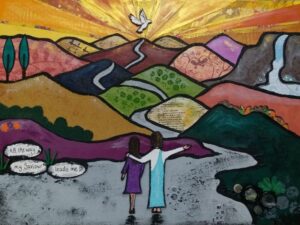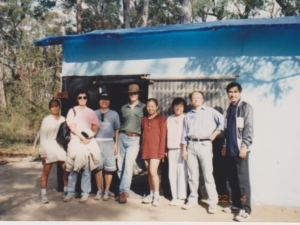
Cross Over to the Other Side
For Christians, the word ‘cross’ symbolises the centrepiece of our faith. However, it is also a verb which denotes an action, a definite and deliberate

Jonathan is a writer and Bible teacher, and the minister-at-large for Keswick Ministries. He was previously Associate General Secretary of the IFES, Director of Langham Preaching, and Ministry Director of Keswick Ministries, and he is frequently involved in teaching and training events on behalf of these agencies in different parts of the world. He is the author of several books and has just published ‘Essentially One: striving for the unity God loves’ (IVP), looking at the challenges of maintaining unity in the context of difference and division within the Christian community. He is married to Margaret, and they live in Oxford.
What do you think is the greatest challenge for missionaries?
Apparently it’s not necessarily the uncomfortable climate, the unfamiliar diet, the difficulties of language, the cultural disorientation or even resistance to the gospel in the host culture. The big challenge for many is actually getting on with fellow Christians in the mission team. The same is true in any context where Christians are working together. We struggle with relational issues of all kinds, and these can become conflicts which have debilitating consequences for our Christian life and mission.
One example of relational conflict is found in the church in Philippi. Paul makes a passionate appeal: ‘I plead with Euodia and I plead with Syntyche to be of the same mind in the Lord’ (Philippians 4:2). Euodia and Syntyche were both members of the Christian family in Philippi but they could not get on.
It’s possible that, because of its potential for disruption, this disagreement was the issue which provoked his letter in the first place. There is no clue about the reason, but there are significant lessons here for our churches and mission agencies.
First, there is no mistaking Paul’s warm pastoral tone. Far from being adversarial or critical, he writes with affection and affirmation to dear friends ‘whom I love and long for, my joy and crown’ (4:1). They are part of the same family; their names are in the same book of life (4:3).
We learn too from his Christ-centred appeal. He pleads with them to be of the same mind ‘in the Lord’, just as he had written earlier: ‘If you have any encouragement from being united with Christ’ (2:1). Not only are they part of the same family, they share the same life. And there is more.
He underlines their shared commitment as fellow workers, because theirs is a disagreement between two significant gospel partners (4:3). So, they are part of the same family, sharing the same life, and members of the same team. More than that, he refers to them as ‘my joy and crown’ as he thinks about that future day of Christ’s return. Everything about Paul’s approach is designed to build bridges.
resolving conflict…is authentic evidence to a watching world of the gospel of reconciliation
Jonathan Lamb, Writer and Bible teacher Tweet
The reason why this is such a wise strategy is that he is reminding his fellow workers of the things that really matter – the big concerns of being in the same family, of being gospel workers together, of sharing a place in the book of life and of looking forward to Jesus’ return. In any conflict, we must bring these great truths to the front of our minds and hearts. The story is often told of Admiral Nelson who, shortly before the Battle of Trafalgar, heard that Admiral Collingwood was not on good terms with Captain Rotherham, who commanded a ship within Collingwood’s fleet. So he called them together. Joining their hands, he pointed to the French ships on the horizon and said, ‘Yonder is the enemy.’ And they returned to their ships to work side by side in the battle.
Next, Paul is hopeful that Euodia and Syntyche will be open to receive help. He asks a fellow believer: ‘you, my true companion, help these women … ’ (4:3). Paul is making an important call, because wise, empathetic pastoral involvement on the part of another member of the Christian family is often essential. How much we need such bridge-builders, mediators and encouragers in the church. Resolution will require an attitude of mind that understands the vital need for harmony and resists the destructive power of discord, and almost always it will need the patient help of others.
Perhaps this is why Paul moves to his final exhortations with an appeal for gentleness: ‘Let your gentleness be evident to all’ (Philippians 4:5). The word implies a willingness to give way: not a determination to stand on our rights, but a readiness to go the second mile. I am occasionally involved in trying to resolve conflicts among fellow Christians and, in the heat of the debate, I notice a tendency for attitudes to harden – as one person expresses their position more forcefully, the other moves further away from possible compromise. Gentleness results from the Spirit’s ministry in our lives. It is the fruit of genuine love for a fellow member of the family. It defuses conflict and breathes a spirit of reconciliation.
We don’t know the eventual outcome of the pastoral intervention in Philippi but we can confidently say that resolving conflict is essential for the health and mission of the church, and is authentic evidence to a watching world of the gospel of reconciliation. Euodia and Syntyche would have heard Paul’s letter read to the congregation, and it is a vital encouragement for churches worldwide today: ‘Whatever happens, conduct yourself in a manner worthy of the gospel of Christ’ (1:27).
Jonathan develops these themes more fully in his recently published book, Essentially One: striving for the unity God loves’, IVP https://ivpbooks.com/essentially-one

For Christians, the word ‘cross’ symbolises the centrepiece of our faith. However, it is also a verb which denotes an action, a definite and deliberate

“Why not try to paint a picture based on your favourite hymn?” There are many hymns I love, so it’s always hard to choose a

I was raised in a Christian family and was 12 when the Lord called my parents to missionary service. Seeing other countries and cultures was

“You’re not Irish!” he said with a derogatory smile on his face. I was confused, because I thought I was. Some might quip that it

What playlist have you planned to use this summer and what’s it called? Nowadays many of us use playlists on our phones or tablets to

Some words can provoke a reaction. I have sometimes spiced up a conversation with friends by dropping in a word that I know will be

What do you think is the greatest challenge for missionaries? Apparently it’s not necessarily the uncomfortable climate, the unfamiliar diet, the difficulties of language, the

Interesting times we live in! Even if you were alive for the last global pandemic, none of us have experienced anything like this before. The

In this blog, let us think about how our strategies in mission compare with the early church in Acts. Here are two passages from Acts which

Standing one evening with my grandson, who was three years old at the time, we were gazing into the dark night sky. Trying to be

God’s call to us was progressive, slow and measured. Probably, in my case, it started when I was born to missionary parents who came from

Coronavirus: the word on everyone’s lips and the fear in (almost) everyone’s hearts. Response to the pandemic has been mixed. We cannot fail to be

With every job description comes information about the task at hand: what have I to do? Who do I report to? What resources are available

What does it mean to waste life? This is a burning question that all human beings need to face as individuals. Many are wasting the

Being a missionary is not an occupation that many young people would consider these days. When I started as a missionary, there was no salary,

It was toward the end of 1989 when the Lord stopped me in my tracks. For years I had heard the gospel through a Christian

In Acts 8:26-35, we eavesdrop as Philip shares the Message of Jesus with a fellow-traveller. 1) Listening to God (8:26, 29) Philip was a person open

In my first blog I mentioned how important Christian camps have been to us as a family and especially to our two boys Josiah and Joseph.

What should our strategy for mission be?That’s a question many books and articles seek to grapple with. But whilst a lot of these strategies are

These were the remarkable words that Jesus said to his disciples. They’d seen that the crowd who were there to listen to Jesus were in
If you would like to receive information about our next events feel free to sign up to our mailing list.
© Copyright 2019 GLO Europe. All Rights Reserved | GLO-Europe is a charitable Trust based at 78 Muir Street, Motherwell, ML1 1BN.